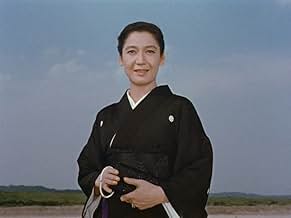The family of an older man who runs a small sake brewery become concerned with his finances and his health after they discover him visiting an old mistress from his youth.The family of an older man who runs a small sake brewery become concerned with his finances and his health after they discover him visiting an old mistress from his youth.The family of an older man who runs a small sake brewery become concerned with his finances and his health after they discover him visiting an old mistress from his youth.
- Awards
- 1 win & 1 nomination total
- Director
- Writers
- All cast & crew
- Production, box office & more at IMDbPro
Featured reviews
Late Spring, Tokyo Story, Early Spring, and Tokyo Twilight
Ozu returns to familiar territory, including marrying off unwed relatives, familial obligations balanced against personal fulfillment, and the simple pleasures of domestic life. It all looks nice, each shot meticulously composed, and with added attention to ambient sound effects, like the sound of crickets chirping in the afternoon. Ozu only directed one film after this, 1962's An Autumn Afternoon, before dying in 1963 at age 60. His frequent star, and a major Japanese film fixture of the post-war years, Setsuko Hara, would also only appear in one more film, 1962's Chushingura. She lived in retirement another 53 years, passing away in 2015 at the age of 95.
The main crux of the story rests on the patriarch of the family, Manbei, who continues to see a woman he knew while he was married, a notion which naturally upsets at least one of his daughters. The other two seem more pensive about the situation, leading them to contemplate their own lives as the eldest is widowed herself and debating whether or not to remarry while the youngest is wondering who she should marry. It is worth noting how Ozu portrays the elder generation as being more open to passion and vigorous living than the younger. The conclusion seems to be that despite the inevitability of death, how one lives one's life determines how they will be remembered rather than who they were perceived to be. Though death remains ever-important, it cannot and should not prevent one from attempting to live to the fullest possible existence.
There is no Ozu film nearest Sirk's or Minneli's universe like this one.
Did you know
- TriviaThe last of six collaborations between Yasujiro Ozu and Setsuko Hara.
- Quotes
Kitagawa Yanosuke: We humans can't come to terms with death until it's too late. Even people like my brother, who did as he pleased. On his deathbed, even Toyotomi Hideyoshi said: "It's as if my glorious life was but a dream within a dream."
- ConnectionsReferenced in I Lived, But... (1983)
- SoundtracksIn a Persian Market
Composed by Albert Ketèlbey
- How long is The End of Summer?Powered by Alexa



































